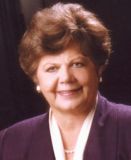Former Utah Governor Olene Walker, top, Former Utah Senator Bob Bennett bottom.The way Utah selects candidates for state and federal office is perhaps the most undemocratic nominating process in the United States. That’s why a public-spirited group is launching what promises to be a long and difficult attempt to change the system.
The powers that be have made the initiative process even more difficult than it used to be, requiring more signatures in a narrower time frame. But it is an effort that everyone who cares about good government in Utah should get behind.
As it stands, ballot slots belonging to the Republican and Democratic parties in November elections are filled by a caucus-and-convention system that gives virtually all power to a handful of party activists. The amount of time and energy necessary to truly participate in the process will only be found in a very small portion of the populace, predictably those with extreme ideological agendas, either right or left.
Because the Republican Party is so dominant in Utah, and because that party’s nominees are chosen by a small cadre of ideological purists, our office-holders often are, or pretend to be, far to the right of even Utah’s conservative mainstream.
The situation was so bad that, for the 2012 election cycle, The Church of Jesus Christ of Latter-day Saints openly encouraged a wider participation, canceling any church-related activities that might conflict with either party’s caucus night.
A group of Utah Republicans who are hardly strangers to the political system, including former Gov. Michael Leavitt, openly worries about the effect the process has had. They are particularly stung that the convention system ended the careers of such generally popular Republican office-holders as former Sen. Bob Bennett and former Gov. Olene Walker.
So the idea hit upon by a group that is about to begin circulating an initiative petition around the state is to make true primary elections part of the process.
Each party could still have its caucuses and its conventions, with that elite corps of activists still naming the candidate they would prefer to carry their party’s standard. But the new system would allow any candidate who could gather sufficient signatures on a petition to use that route to a slot on a primary election ballot, squaring off against the convention’s choice in an election open to all voters who are registered as affiliated with that party.
Such a process would include tens of thousands more Utah voters, boosting the fortunes of candidates who, as legislators, would be much more likely to open up the legislative process, put an end to secret caucuses and be less brazen about gerrymandering congressional and legislative districts.
And make it easier to get laws initiated by petition.


No comments:
Post a Comment